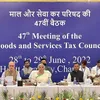GST council gives relief to small online retailers; defers decision on online gaming tax hike
Small businesses with an annual turnover of up to Rs 40 lakh doing ecommerce will be exempted from compulsory GST registration.
The Goods and Services Tax (GST) Council has recommended a slew of measures which are expected to provide relief to small businesses that primarily conduct their transactions online.
The two-day 47th meeting of the GST council, which concluded on Wednesday, has recommended that businesses with an annual turnover up to Rs 40 lakh, and Rs 20 lakh turnover for goods and services conducting their transactions primarily through the ecommerce route, will be exempted from compulsory registration and will have the option to move to the composite scheme. This is expected to benefit around 1.2 lakh small businesses.
This was among the other recommendations made by the Council which was announced by Union Finance Minister Nirmala Sitharaman. The meeting was also attended by Union Minister of State for Finance Pankaj Choudhary, besides finance ministers of states and union territories, as well as senior officers of the Ministry of Finance and states/UTs.
The new recommendation is expected to become operational from January 2023. As of now, small businesses transacting through the ecommerce channel have to compulsorily register for GST. Added to this, the shift to composite scheme will allow these small businesses to have the benefit of lower rate of tax and simpler compliance.
The changes would bring parity between entities that are doing businesses through either the online or offline mode under GST.
Rajneesh Kumar, Chief Corporate Affairs Officer at Group, said,
"This decision by the GST Council to bring parity for sellers on ecommerce platforms is very commendable. This will reduce the compliance burden for small businesses, especially artisans, weavers, handicraft makers, artists, and homemakers to access markets through ecommerce and smoothen their onboarding on these digital platforms. This decision will encourage and provide a boost to the digital India agenda of the country besides helping these small businesses grow and prosper."

The GST Council has recommended a slew of measures which are expected to provide relief to small businesses
Welcoming the decision, Founder and CEO Vidit Aatrey said, “This step brings much-needed parity between offline and online businesses. With an estimated five crore MSMEs currently unable to sell online due to compulsory GST requirements, this game-changing measure can be an enabler for millions of small units including artisans, boutiques and mom-and-pop stores.”
According to Vidit, in 2022, around 60 percent of small businesses looking to come online on Meesho dropped off on account of GST requirements. Now, they will be able to address a larger market.
Among other decisions taken during the meeting, the council has also deferred a decision to raise the GST from 18 percent to 28 percent on online gaming to bring it at par with chance games like gambling and betting.
According to media reports, the group of ministers (GoM) had recommended that online gaming activities be taxed at 28 percent on the full value of the consideration, by whatever name such consideration may be called including contest entry fee, paid by the player for participation in such games without making a distinction such as games of skill or chance etc.
Here are the items that will now attract GST:
- Pre-packed and labelled food items such as meat, fish, curd, paneer, and honey will now attract 5 percent GST.
- An 18 percent GST will be levied on fee charged by banks for the issue of cheques (loose or in book form)
- Maps and charts including atlases will attract 12 percent GST.
- A 12 percent tax on hotel rooms below Rs 1,000 per day will be levied, as against a tax exemption currently
- Goods that are unpacked, unlabelled, and unbranded will continue to remain exempt from GST.
The date of implementation of these recommendations has not been decided yet. The groups of ministers have recommended that GST exemption can continue on items of daily use including bread, hearing aids, incense sticks, utensils, tractors, and agri-related machinery.
The GST Council has also recommended a correction in the inverted duty structure for a host of items, including edible oil, coal, LED lamps, printing/drawing ink, finished leather, and solar water heater.
(The story was updated with a quote.)
Edited by Kanishk Singh








